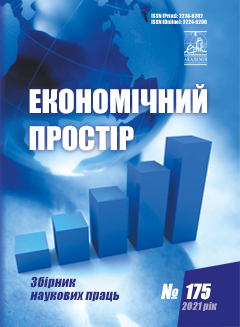ТЕОРЕТИКО-МЕТОДОЛОГІЧНІ ЗАСАДИ ВПЛИВУ СЕКТОРУ ІНФОРМАЦІЙНО-КОМУНІКАЦІЙНИХ ТЕХНОЛОГІЙ НА ВІДТВОРЕННЯ СУСПІЛЬНИХ БЛАГ У НАЦІОНАЛЬНІЙ ЕКОНОМІЦІ
Анотація
Окреслено основні теоретико-методологічні підходи до розуміння значення сектору інформаційно-комунікаційних технологій (СІКТ) для поліпшення відтворення суспільних благ (СБ) у національній економіці. Обґрунтовано, що розвиток СІКТ поліпшує ефективність взаємодії держави, фірм і домогосподарств у цій сфері через надання інформаційних послуг, розроблення програмного забезпечення, активізацію використання споживачами і виробниками СБ комп’ютерної техніки та технологій. Визначено, що поліпшення результативності відтворення СБ передбачає активізацію використання інформаційно-комунікаційних технологій через розвиток різних Інтернет-платформ взаємодії їхніх виробників і користувачів, підвищення цифрової грамотності споживачів, надання інформаційно-консалтингових послуг і становлення культури цифрової взаємодії.
Посилання
Besley T., Ghatak M. Public-Private Partnerships for the Provision of Public Goods: Theory and Applications to NGOs. The Development Economics Discussion Papers Series. 1999. № 17. August. 38 p.
Deacon R. Public Good Provision under Dictatorship and Democracy. Public Choice. 2009. Vol. 139. № 1–2. P. 241–262.
Gehlbach S. Electoral Institutions and the National Provision of Local Public Goods. Quarterly Journal of Political Science. 2007. Vol. 2. № 1. P. 5–25.
Saha S. Democratic Institutions and Provision of a Public Goods. Economics Working Paper Series. 2007. Vol. 55. № 3. URL: http://www.econ.ucsb.edu/papers/wp02-07.pdf (Last accessed: 18.11.2021).
Williams A. The Optimal Provision of Public Goods in a System of Local Government. The Journal of Political Economy. 1966. V. 74. P. 18–33.
Zhuravskaya E. Incentives to Provide Local Public Goods: Fiscal Federalism, Russian Stile. Journal of Public Economics. 2000. № 76. Р. 337–368.
Грабова О.Н. Экономические отношения в производстве общественных благ : автореф. дис. ... канд. экон. наук : 08.00.01 ; Костромск. госуд. ун-т им. Н.А. Некрасова. Кострома, 2003. 24 с.
Котельников А.А. Государственная поддержка воспроизводства опекаемых благ : автореф. дис. ... канд. экон. наук : 08.00.01 ; Саратов. госуд. соц.-эконом. ун-т. Саратов, 2010. 20 с.
Винокурова Ю.А. Проблемы реформирования воспроизводства общественных благ в Российской Федерации : автореф. дис. ... канд. экон. наук : 08.00.01 ; Казанский госуд. ун-т им. В.И. Ульянова-Ленина. Казань, 2001. 19 с.
Линева Н.К. Особенности локальных общественных благ в транзитивной экономике : автореф. дис. … канд. экон. наук : 08.00.01 ; Южно-Уральский госуд. ун-т. Челябинск, 2004. 25 с.
Федорова Ю.В. Глобальные тенденции производства общественных благ : автореф. дис. … д-ра экон. наук : 08.00.01 «Экономическая теорія» ; Саратовский госуд. социально-эконом. ун-т. Саратов, 2005. 36 с.
Водяненко О.И. Инвестиции в производство общественных благ : тенденции и особенности развития в России : автореф. дис. ... канд. экон. наук : 08.00.01 ; Саратовский государственный социально-экономический ун-т. Саратов, 2012. 18 с.
Рубинштейн А.Я. Экономика общественных преференций. Структура и эволюция социального интереса : монография. Санкт-Петербург : Алетейя, 2008. 560 с.
Кічурчак М. Концепт відтворення суспільних благ в економічній теорії. Вісник Київського національного університету імені Тараса Шевченка. 2018. № 1(196). С. 33–40.
Кічурчак М. Економіко-гносеологічні засади визначення сутності суспільних благ. Економічний форум. 2018. № 4. С. 4–13.
Lupia A., Sin G. Which Public Goods Are Endangered?: How Evolving Communication Technologies Affect The Logic of Collective Action. Public Choice. 2003. Vol. 117. № 3–4. P. 315–331. DOI: 10.1023/B:PUCH.0000003735.07840.c7.
Bhatnagar, S. Public Service Delivery: Role of Information and Communication Technology in Improving Governance and Development Impact. ADB Economics Working Paper Series. 2014. № 139. 36 р.
Besley, T., &Ghatak, M. (1999). Public-PrivatePartnershipsfor the Provision of Public Goods: Theory and Applications to NGOs. The Development Economics Discussion Papers Series, 17, August.
Deacon, R. (2009). Public Good Provision under Dictatorship and Democracy. Public Choice, 139 (1–2), 241–262. DOI 10.1007/s11127-008-9391-x.
Gehlbach, S. (2007). Electoral Institutions and the National Provision of Local Public Goods. Quarterly Journal of Political Science, 2 (1), 5–25.
Saha, S. (2007). Democratic Institutions and Provision of a Public Goods. Economics Working Paper Series, 55 (3). URL: http://www.econ.ucsb.edu/papers/wp02-07.pdf (Last accessed: 18.11.2021).
Williams A. The Optimal Provision of Public Goods in a System of Local Government. The Journal of Political Economy. 1966. V. 74. P. 18–33.
Zhuravskaya, E. (2000). Incentives to Provide Local Public Goods: Fiscal Federalism, Russian Stile. Journal of Public Economics, 76, 337–368. https://doi.org/10.1016/S0047-2727(99)00090-0.
Grabova, O.N. (2003). Ekonomicheskie otnosheniia v proizvodstve obshchestvennykh blag [Economic relations in the production of public goods] (Abstract of PhD thesis). Kostromsk. gosud. un-t im. N.A.Nekrasova, Kostroma. [in Russian]
Kotelnikov, A.A. (2010). Gosudarstvennaia podderzhka vosproizvodstva opekaemykh blag [Thestate support for reproduction of meritgoods](Abstract of PhD thesis). Saratov. gosud. soc.-ekonom. un-t, Saratov. [in Russian]
Vinokurova, Iu.A. (2001). Problemy reformirovaniia vosproizvodstva obshchestvennykh blag v Rossiiskoi Federatcii [Problems of reforming the reproduction of public goods in the Russian Federation] (Abstract of PhD thesis). Kazanskij gosud. un-t im. V.I.Ul'yanova-Lenina, Kazan'. [inRussian]
Lineva, N.K. (2004). Osobennosti lokalnykh obshchestvennykh blag v tranzitivnoi ekonomike [The features of local public goods in the transitive economy](Abstract of PhD thesis). YuzhnoUral'skij gosud. un-tet, Chelyabinsk. [in Russian]
Fedorova, Iu.V. (2005). Globalnye tendentcii proizvodstva obshchestvennykh blag [Global trends in public goodsproduction] (Abstract of doctor thesis). Saratovskij gosud. social'no-e'konom. un-tet, Saratov. [inRussian]
Vodianenko, O.I. (2012) Investitcii v proizvodstvo obshchestvennykh blag: tendentcii i osobennosti razvitiia v Rossii [Investments in the production of public goods: trends and features of development in Russia](Abstract of PhD thesis). Saratov. gos. soc.-ekonom. un-t, Saratov. [inRussian]
Rubinshtein, A.Ia. (2008). Ekonomika obshchestvennykh preferentcii. Struktura i evoliutciia sotcialnogo interesa [Economics of public preferences. Structure and evolution of cocial interest]. SPb.: Aleteiia. 560 s. [in Russian]
Kichurchak, M. (2018) Kontsept vidtvorennia suspilnykh blah v ekonomichnii teorii [Concept of public goods reproduction in economics]. Visnyk Kyivskoho natsionalnoho universytetu imeni Tarasa Shevchenka [Bulletin of Taras Shevchenko National University of Kyiv. Economics], 1 (196), 33–40. DOI: https://doi.org/10.17721/1728-2667.2018/196-1/5. [inUkrainian]
Kichurchak, M. (2018). Ekonomiko-hnoseolohichni zasady vyznachennia sutnosti suspilnykh blah [The economic-gnoseology principles of the public goods essence determination]. Ekonomichnyi forum [Economic forum], 4, 4–13. [inUkrainian]
Lupia, A., Sin, G. (2003). Which Public Goods Are Endangered?: How Evolving Communication Technologies Affect The Logic of Collective Action. Public Choice, 117 (3–4), 315–331. DOI: https://doi.org/10.1023/B:PUCH.0000003735.07840.c7.
Bhatnagar, S. (2014).Public Service Delivery: Role of Information and Communication Technology in Improving Governance and Development Impact. ADB Economics Working Paper Series, 139.



